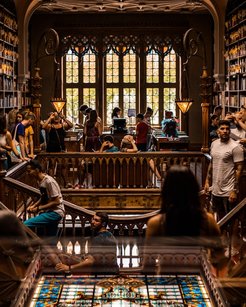Blog | December 2021, Talking Humanities
Rehumanising scholarship
by Farhan Samanani
This isn’t about me – this is about the value of knowledge in a hurting world. But I hope readers will forgive me if I start on more personal territory.
My first book, ‘How to Live With Each Other: An Anthropologists’ Notes for Sharing a Divided World’, will come out in March 2022. At its heart, it’s a book based on my PhD research, where I spent nearly a year and a half living in the London neighbourhood of Kilburn as an ethnographer. Kilburn teems with difference, and I wanted to understand how residents made sense of this diversity, how it came to matter, and then how they found ways of connecting across meaningful differences.
The book, however, will come out with a commercial publisher. And in order to tell the sort of story that would be compelling to a wider audience, it has become about much more than my ethnographic work in Kilburn. It weaves together stories from across democratic societies, as well as from the vast record of human diversity studied by anthropologists. It combines history, philosophy, anthropology, psychology, literature and science and technology studies in as lively a way as I could manage. It was a tricky thing to write.

For an early-career academic, there’s a certain risk in writing and publishing this way, especially in a hyper-competitive job market. Even so, I’m convinced that if academic knowledge is really to count for something, working and writing in this way is essential. In the book, I include a powerful quote from Toni Morrison, from a talk in 1975:
‘the function, the very serious function of racism […] is distraction. It keeps you from doing your work. It keeps you explaining over and over again, your reason for being. Somebody says you have no language and so you spend twenty years proving that you do. Somebody says your head isn’t shaped properly so you have scientists working on the fact that it is. Somebody says that you have no art so you dredge that up. Somebody says that you have no kingdoms and so you dredge that up. None of that is necessary. There will always be one more thing.’
I use this quote to help explore the stubborn resilience of racial inequality, as well as how communities have shaped their own strategies for survival in the shadow of persistent exclusion. But Morrison is saying something important not just about racism, but about the role and purpose of scholarship and art.
If we are not careful, both social science and the humanities can easily become reactionary. The government institutes austerity, and you spend ten years establishing all the ways it hurts the most vulnerable; someone writes a novel, and literature scholars can spend whole careers unpacking it.
The promise of scholarship, as I understand it, is that it creates possibility. The conversation about austerity has the potential to point to a different sort of politics, to a renewed appreciation of social security and public goods; delving into a work of literature helps us approach it in new ways, it allows the book to do new things.
To realise this promise, however, requires more than just producing scholarship. It requires being part of public conversations, it demands different ways of telling stories, it calls for connections with activists, artists and policymakers to help put knowledge into motion, and to test the potential of our propositions in the world beyond peer-review. All this also involves opening the process of producing knowledge up to others – allowing others to claim, define, contest, extend and rework the possibilities contained within our own work, in ways which mean we can never truly be the sole authors of what we say or do. It’s a vulnerable process that tangles us together with the unpredictable lives, perspectives, motivations and needs of others.
If we fail to do these sorts of things, I think what Morrison is saying is that we become part of the ‘distraction’. We think and work on the back foot, always responding, critically and cleverly, but in ways that tacitly subscribe to the world we’ve been handed. If our analysis of austerity simply serves to show how bad things are, and doesn’t circulate in a way where it actively challenges people to make things better, then all we’re really doing is dissecting the world in the abstract, to show off how clever we are. If our exploration of literature isn’t for the public, and delivered in a public voice, and if we yet maintain that we are asking important questions about what it is to be human, then what are we saying about who truly counts as human in the humanities?
Public scholarship, I think, forces us to think of scholarship not as a noun, but as a verb. That is to say the act of thinking – in a meaningful, life-enriching way – is accomplished not just by putting pen to paper, or publishing in a journal, but through the process of knowledge circulating, sparking, pushing and pulling on the world.
There is an endless realm of questions we can ask, both in the social sciences and humanities. But I think we need to always be critical of where our inquiry is leading us. Are we trying to set something in motion – with all the vulnerability, mess and uncertainty such worldly efforts entail – or are we simply producing one more thing?
Photo by redcharlie on Unsplash












